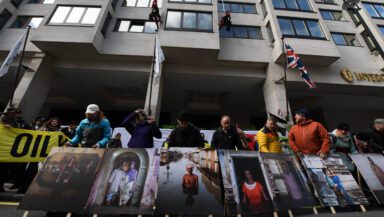A spike in oil and gas prices resulting from Russia’s invasion of Ukraine could provide energy firms operating in the UK with unexpected windfall profits of £11.6bn this year from oil and gas extracted from the North Sea, a new analysis from Greenpeace UK and Oil Change International reveals [1].
Using data from leading industry analysts Rystad Energy, campaigners have calculated that the wartime jump in global energy prices will lead to a projected increase in profits from extracting UK oil and gas of 111%.
According to the analysis, the ten companies that stand to benefit the most from the increase include UK fossil fuels giants BP and Shell as well as Italian oil firm Eni and China’s state-owned CNOOC.
Outside the top ten, the Ineos Group, majority owned by Britain’s richest man Sir James Ratcliffe, is expected to see a 135% increase in its free cash flow, while Russian energy giant Gazprom, which is still extracting UK gas from the North Sea thanks to a joint venture with German company Wintershall Dea, is expected to reap profits of £80m.
The findings come as experts warned four in ten UK households could be plunged into fuel poverty by the end of the year.
The analysis shows that a windfall tax on the £11.6 billion additional profits could relieve energy poverty in the UK, improve the energy efficiency of housing and deliver a mass roll out of clean heating, which would help insure against future price shocks and reduce emissions. This would still leave the oil and gas companies with the £10.5 billion in free cash flow they would have enjoyed had Russia not invaded Ukraine and spiked prices.
£6.6 billion of the taxed profits could provide the six million households experiencing fuel poverty with one off payments of £1,100 pounds each. This would leave £5 billion to invest in the nationwide roll out of heat pumps, insulation and other energy efficiency measures – fulfilling an outstanding pledge from the 2019 Conservative manifesto – as well as increasing investment in renewable energy infrastructure in order to increase energy capacity.
Greenpeace UK’s climate finance advisor, Charlie Kronick, said: “Oil giants are pocketing mountains of cash off the back of Putin’s war, while millions of UK households are facing fuel poverty. Is the UK government really going to just sit back and let this injustice play out?
“These companies were in line to cash in on soaring energy prices even before the war, but through absolutely no effort whatsoever their estimated profits have risen to stratospheric levels.
“The UK government should be exploring every option to help people squeezed by the cost of living crisis yet they’re acting like rabbits caught in the headlights. There’s a simple thing Boris Johnson can do to break the impasse, and that’s bring in a windfall tax on oil giants’ bloated profits and use the money to help struggling households.”
Silje Lundberg, senior campaigner with Oil Change International said: “The current UK tax regime has the lowest governmental tax take in the world for an offshore oil and gas regime. Big Oil and Gas executives are rolling in cash while working families suffer from sky-high bills. It’s high time for the UK Government to pass a windfall profits tax, and stop subsidizing an industry that’s causing climate chaos. It’s up to Boris Johnson and the UK Government to prevent the fossil fuel industry from harnessing a war to make billions.”
Last week, the Chancellor, Rishi Sunak, stated that a windfall tax on oil and gas company profits was not “off the table”, hinting at a possible U-turn. However, his justification was an attempt to blackmail the industry into expansion under the false premise that producing more oil and gas from the North Sea would provide more energy security.
New oil and gas extraction cannot provide energy security, ease the current energy price crisis or reduce bills, since the majority of the oil will be exported as it cannot be refined in the UK and the gas will be sold at the international market price even when used in the UK.
Greenpeace UK and Oil Change International are calling on the UK government to bring in a windfall tax on the UK oil and gas sector’s bloated profits and use the money to help vulnerable households and accelerate the UK’s transition from expensive, volatile fossil fuels, in order to help tackle the cost of living crisis and slash future emissions from homes to help tackle the climate crisis.
ENDS
Contact: Greenpeace UK Press Office – press.uk@greenpeace.org or 07944 244 076
Notes to editor:
Methodology
Rystad Energy’s Ucube database was used to gauge the projected impact of the war on company profits from producing oil and gas in the UK in 2022. The projected free cash flow increase is derived from an increase in the projected average oil and gas price for 2022. In February, before Russia’s invasion of Ukraine began, the average price for Brent Crude oil in 2022 was estimated at $70 per barrel (bbl). This aligned with the U.S. Energy Information Administration’s December 2021 assessment. At that time, projected increases in supply in 2022 were expected to lead to lower prices as supply and demand would become more balanced. On February 24, Russia began its invasion of Ukraine and oil prices spiked to $133 in early March before falling back. Rystad hiked its 2022 oil price to $88/bbl in the March update and $111/bbl in the April update. Our analysis is based on a comparison of the pre-war scenario of $70/bbl and Rystad’s April basecase of $110/bbl. Free cash flow estimates are based on Rystad’s modeling of hundreds of individual oil and gas assets operating in the UK in 2022.



